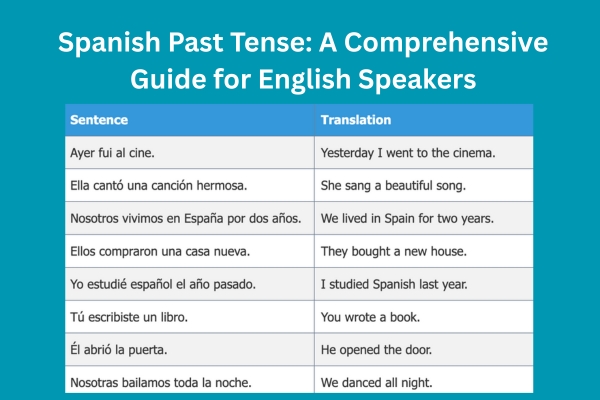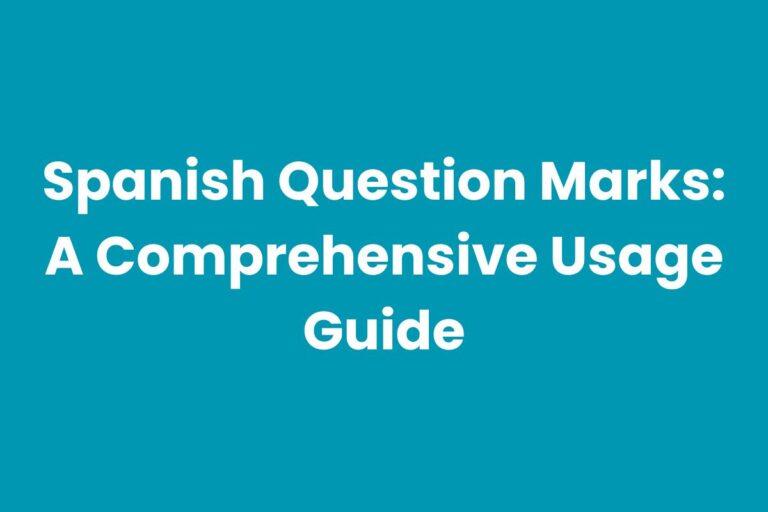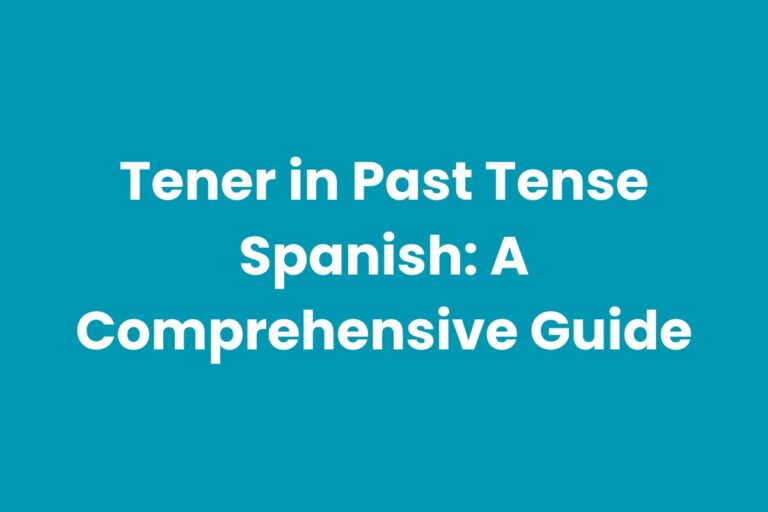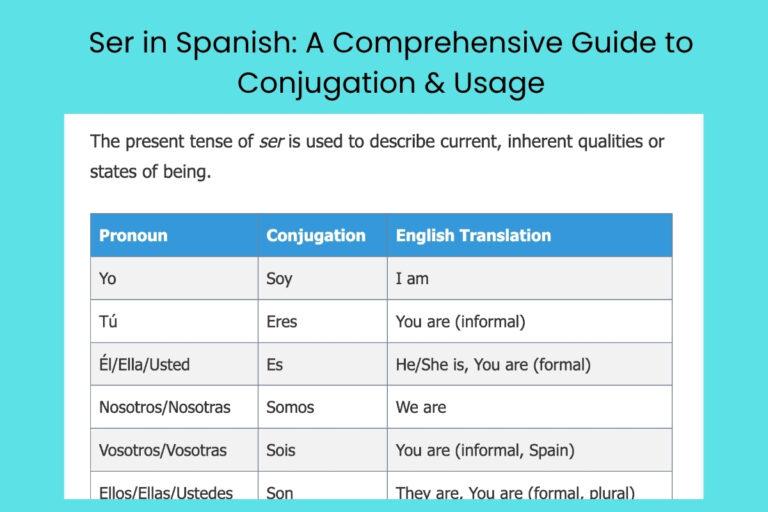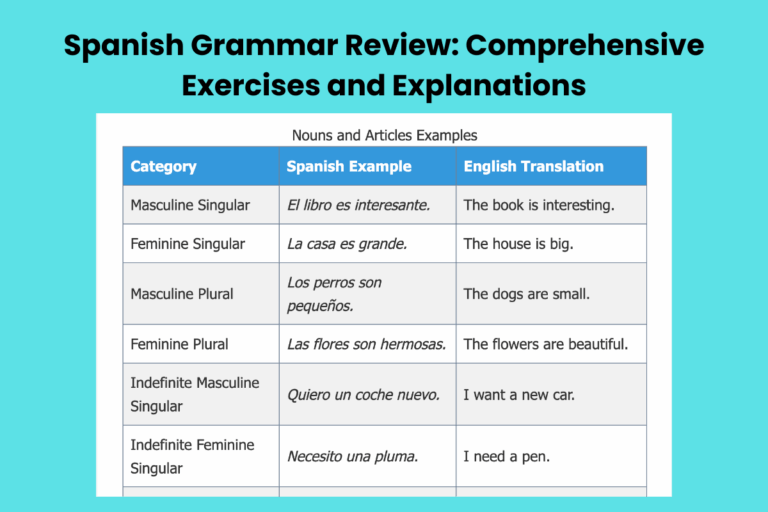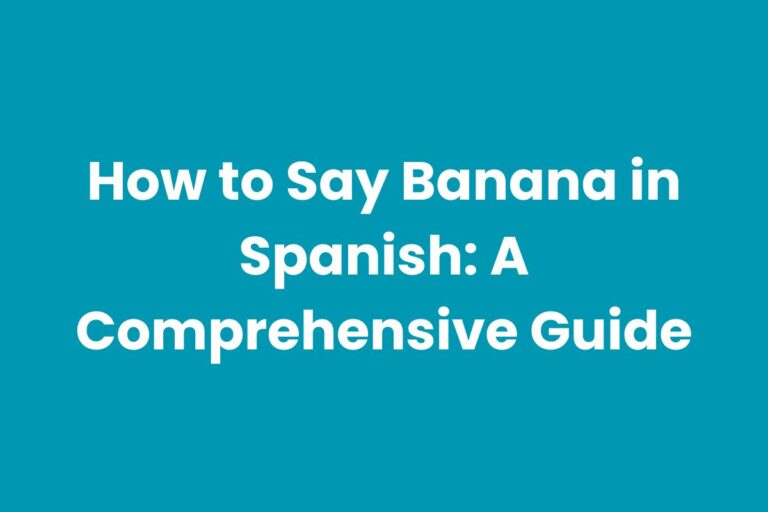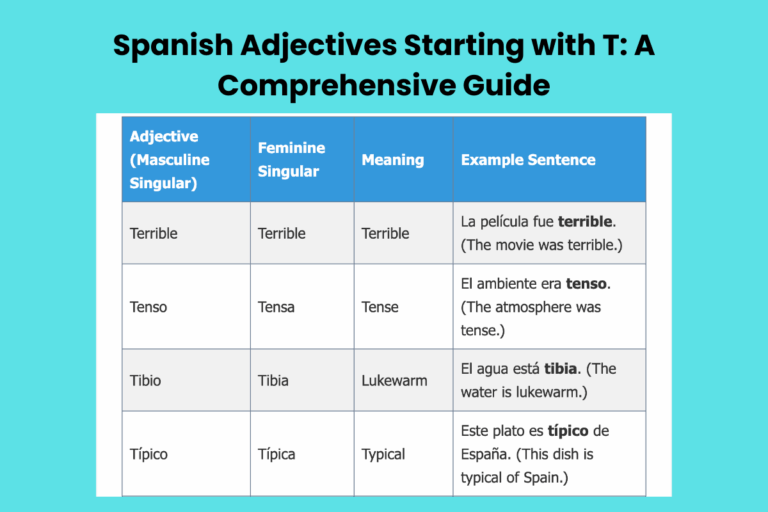Spanish Past Tense: A Comprehensive Guide for English Speakers
Mastering the Spanish past tense is crucial for anyone looking to achieve fluency. It’s not just about memorizing verb conjugations; it’s about understanding the nuances of when to use each past tense to accurately convey your intended meaning.
This guide breaks down the complexities of the Spanish past tense, providing clear explanations, practical examples, and helpful exercises. Whether you’re a beginner or an advanced learner, this article will equip you with the knowledge and skills to confidently navigate the Spanish past.
This article is designed for English speakers learning Spanish, particularly those who are struggling with the differences between the Preterite, Imperfect, and other past tenses. It is also beneficial for intermediate learners who want to refine their understanding and usage of the Spanish past tense.
By the end of this guide, you’ll have a solid foundation for using the Spanish past tense correctly and effectively.
Table of Contents
- Introduction
- Definition of Spanish Past Tense
- Structural Breakdown
- Types and Categories of Spanish Past Tense
- Examples of Spanish Past Tense
- Usage Rules
- Common Mistakes
- Practice Exercises
- Advanced Topics
- FAQ
- Conclusion
Definition of Spanish Past Tense
The Spanish past tense refers to a set of verb conjugations used to describe actions, events, or states that occurred before the present moment. Unlike English, Spanish has multiple past tenses, each with its own specific use and nuance.
Understanding these differences is vital for accurately conveying the timing and nature of past events.
The primary past tenses in Spanish include the Preterite (also known as Indefinido), the Imperfect (Imperfecto), the Perfect (Perfecto Compuesto), and the Pluperfect (Pluscuamperfecto). The Preterite Anterior (Anterior) is also a past tense, but it’s rarely used in modern Spanish.
Each tense serves a distinct function. The Preterite is used for completed actions in the past, the Imperfect for ongoing or habitual actions in the past, the Perfect for actions completed recently or with relevance to the present, and the Pluperfect for actions completed before another past action. Choosing the correct tense depends on the context and the specific meaning you want to convey.
Structural Breakdown
The structure of Spanish past tense verbs depends on whether they are regular or irregular. Regular verbs follow predictable conjugation patterns, while irregular verbs have unique forms that must be memorized. Each past tense also has its own set of endings that are added to the verb stem.
For regular verbs in the Preterite, the endings for -ar verbs are: -é, -aste, -ó, -amos, -asteis, -aron. For -er and -ir verbs, the endings are: -í, -iste, -ió, -imos, -isteis, -ieron.
In the Imperfect, regular -ar verbs end in: -aba, -abas, -aba, -ábamos, -abais, -aban. Regular -er and -ir verbs end in: -ía, -ías, -ía, -íamos, -íais, -ían.
The Perfect tense is formed using the auxiliary verb haber in the present tense plus the past participle of the main verb. The past participle is formed by adding -ado to the stem of -ar verbs and -ido to the stem of -er and -ir verbs (with some irregularities).
The Pluperfect tense is formed using the auxiliary verb haber in the imperfect tense plus the past participle of the main verb.
Types and Categories of Spanish Past Tense
Preterite (Indefinido)
The Preterite tense, also known as the Indefinido, is used to describe completed actions in the past that have a definite beginning and end. It’s used for single events, a series of completed actions, or actions that occurred at a specific point in time.
For example, “Ayer comí pizza” (Yesterday I ate pizza) indicates a completed action (eating pizza) that happened at a specific time (yesterday).
Imperfect (Imperfecto)
The Imperfect tense is used to describe ongoing actions, habitual actions, or descriptions in the past. It’s used for actions that were in progress without a defined end point, or for describing past states, conditions, or characteristics.
For example, “Cuando era niño, jugaba al fútbol todos los días” (When I was a child, I used to play soccer every day) describes a habitual action in the past.
Perfect (Perfecto Compuesto)
The Perfect tense is used to describe actions that have been completed recently or have relevance to the present. It connects the past to the present, indicating that the action has a current impact or consequence.
For example, “He comido mucho hoy” (I have eaten a lot today) indicates that the action of eating has an impact on the present (feeling full).
Pluperfect (Pluscuamperfecto)
The Pluperfect tense is used to describe an action that was completed before another action in the past. It indicates that one past action preceded another past action.
For example, “Ya había comido cuando llegaste” (I had already eaten when you arrived) indicates that the action of eating was completed before the action of arriving.
Preterite Anterior (Anterior)
The Preterite Anterior is used to describe an action that was completed immediately before another action in the past. It is formed with the auxiliary verb “haber” in the preterite tense followed by the past participle.
It is rarely used in modern Spanish, and its use is primarily limited to literary contexts. It emphasizes the sequence of two past actions, with the first action completed very closely before the second.
For example, “Apenas hubo terminado de hablar, salió de la habitación” (As soon as he had finished speaking, he left the room). The use of the Preterite Anterior here stresses that the act of finishing speaking and leaving the room happened almost simultaneously.
Examples of Spanish Past Tense
Preterite Examples
The following table provides examples of the Preterite tense, demonstrating its use for completed actions in the past.
| Sentence | Translation |
|---|---|
| Ayer fui al cine. | Yesterday I went to the cinema. |
| Ella cantó una canción hermosa. | She sang a beautiful song. |
| Nosotros vivimos en España por dos años. | We lived in Spain for two years. |
| Ellos compraron una casa nueva. | They bought a new house. |
| Yo estudié español el año pasado. | I studied Spanish last year. |
| Tú escribiste un libro. | You wrote a book. |
| Él abrió la puerta. | He opened the door. |
| Nosotras bailamos toda la noche. | We danced all night. |
| Vosotros comisteis paella. | You (plural, informal) ate paella. |
| Ustedes trabajaron mucho. | You (plural, formal) worked a lot. |
| El concierto terminó a las diez. | The concert ended at ten o’clock. |
| La lluvia comenzó a las tres. | The rain started at three o’clock. |
| La película duró dos horas. | The movie lasted two hours. |
| El tren llegó tarde. | The train arrived late. |
| El partido empezó a las ocho. | The game started at eight o’clock. |
| Visitamos el museo el domingo. | We visited the museum on Sunday. |
| Caminé al parque ayer por la tarde. | I walked to the park yesterday afternoon. |
| Cené con mis amigos el sábado. | I had dinner with my friends on Saturday. |
| Limpié mi casa el fin de semana pasado. | I cleaned my house last weekend. |
| Llamé a mi madre anoche. | I called my mother last night. |
| Navegué por internet durante una hora. | I surfed the internet for an hour. |
| Organicé una fiesta sorpresa para mi hermano. | I organized a surprise party for my brother. |
| Participé en una carrera el mes pasado. | I participated in a race last month. |
| Pregunté la hora a un desconocido en la calle. | I asked a stranger on the street for the time. |
| Quemé el pastel por accidente. | I burned the cake by accident. |
| Reparé mi bicicleta después de la caída. | I repaired my bicycle after the fall. |
| Salté de alegría al recibir la noticia. | I jumped for joy upon receiving the news. |
| Toqué el piano en el concierto de la escuela. | I played the piano at the school concert. |
| Usé mi tarjeta de crédito para comprar los boletos. | I used my credit card to buy the tickets. |
| Viajé a Europa el verano pasado. | I traveled to Europe last summer. |
Imperfect Examples
The following table provides examples of the Imperfect tense, demonstrating its use for ongoing actions, habitual actions, and descriptions in the past.
| Sentence | Translation |
|---|---|
| Cuando era niño, jugaba al fútbol. | When I was a child, I used to play soccer. |
| Ella siempre cantaba en la ducha. | She always used to sing in the shower. |
| Nosotros vivíamos cerca del mar. | We used to live near the sea. |
| Ellos tenían mucho dinero. | They used to have a lot of money. |
| Yo estudiaba todas las noches. | I used to study every night. |
| Tú siempre llegabas tarde. | You always used to arrive late. |
| Él era muy alto. | He was very tall. |
| Nosotras bailábamos salsa. | We used to dance salsa. |
| Vosotros comíais mucha carne. | You (plural, informal) used to eat a lot of meat. |
| Ustedes trabajaban en una fábrica. | You (plural, formal) used to work in a factory. |
| El sol brillaba intensamente. | The sun was shining brightly. |
| La lluvia caía suavemente. | The rain was falling gently. |
| La música sonaba fuerte. | The music was playing loudly. |
| El viento soplaba fuerte. | The wind was blowing strongly. |
| El café olía delicioso. | The coffee smelled delicious. |
| Visitábamos a nuestros abuelos cada verano. | We used to visit our grandparents every summer. |
| Nadaba en la piscina todos los días durante el verano. | I used to swim in the pool every day during the summer. |
| Escuchaba música clásica mientras pintaba. | I used to listen to classical music while painting. |
| Leía novelas de misterio antes de dormir. | I used to read mystery novels before sleeping. |
| Escribía cartas a mis amigos que vivían lejos. | I used to write letters to my friends who lived far away. |
| Corría por el parque todas las mañanas. | I used to run in the park every morning. |
| Cocinaba galletas los fines de semana. | I used to bake cookies on the weekends. |
| Dibujaba paisajes en mi tiempo libre. | I used to draw landscapes in my free time. |
| Aprendía un nuevo idioma cada año. | I used to learn a new language every year. |
| Cantaba en el coro de la iglesia los domingos. | I used to sing in the church choir on Sundays. |
| Bailaba en las fiestas con mis amigos. | I used to dance at parties with my friends. |
| Viajaba por el mundo durante mis vacaciones. | I used to travel the world during my vacations. |
| Trabajaba en una oficina pequeña en el centro de la ciudad. | I used to work in a small office in the city center. |
| Estudiaba medicina en la universidad. | I used to study medicine at the university. |
| Enseñaba español en una escuela secundaria. | I used to teach Spanish in a high school. |
Perfect Examples
The following table provides examples of the Perfect tense, demonstrating its use for actions completed recently or with relevance to the present.
| Sentence | Translation |
|---|---|
| He comido mucho hoy. | I have eaten a lot today. |
| Ella ha cantado en muchos conciertos. | She has sung in many concerts. |
| Nosotros hemos vivido en esta ciudad por cinco años. | We have lived in this city for five years. |
| Ellos han comprado un coche nuevo. | They have bought a new car. |
| Yo he estudiado mucho para el examen. | I have studied a lot for the exam. |
| Tú has escrito un correo electrónico. | You have written an email. |
| Él ha abierto la ventana. | He has opened the window. |
| Nosotras hemos bailado juntas. | We have danced together. |
| Vosotros habéis comido toda la tarta. | You (plural, informal) have eaten all the cake. |
| Ustedes han trabajado muy duro. | You (plural, formal) have worked very hard. |
| He visto esa película tres veces. | I have seen that movie three times. |
| Hemos viajado por toda Europa. | We have traveled all over Europe. |
| Han aprendido mucho en la universidad. | They have learned a lot at the university. |
| Has leído ese libro? | Have you read that book? |
| Ha llovido mucho esta semana. | It has rained a lot this week. |
| He hecho ejercicio esta mañana. | I have exercised this morning. |
| Hemos visitado a nuestros amigos. | We have visited our friends. |
| Han terminado el proyecto. | They have finished the project. |
| Has llamado a tu madre? | Have you called your mother? |
| He cocinado la cena. | I have cooked dinner. |
| He limpiado la casa. | I have cleaned the house. |
| Hemos plantado flores en el jardín. | We have planted flowers in the garden. |
| Han construido un nuevo edificio. | They have built a new building. |
| Has comprado los regalos de Navidad? | Have you bought the Christmas presents? |
| He escrito una carta a mi abuela. | I have written a letter to my grandmother. |
| Hemos visto un arco iris. | We have seen a rainbow. |
| Han encontrado las llaves? | Have they found the keys? |
| Has perdido tu teléfono? | Have you lost your phone? |
| He olvidado mi paraguas. | I have forgotten my umbrella. |
| Hemos ganado el partido! | We have won the game! |
Pluperfect Examples
The following table provides examples of the Pluperfect tense, demonstrating its use for actions completed before another action in the past.
| Sentence | Translation |
|---|---|
| Ya había comido cuando llegaste. | I had already eaten when you arrived. |
| Ella había cantado antes de enfermarse. | She had sung before getting sick. |
| Nosotros habíamos vivido allí antes de mudarnos. | We had lived there before moving. |
| Ellos habían comprado la casa antes de casarse. | They had bought the house before getting married. |
| Yo había estudiado antes de ir a la universidad. | I had studied before going to university. |
| Tú habías escrito el libro antes de publicarlo. | You had written the book before publishing it. |
| Él había abierto la tienda antes de que llegaran los clientes. | He had opened the store before the customers arrived. |
| Nosotras habíamos bailado juntas antes de separarnos. | We had danced together before separating. |
| Vosotros habíais comido toda la tarta antes de que llegaran los invitados. | You (plural, informal) had eaten all the cake before the guests arrived. |
| Ustedes habían trabajado en ese proyecto antes de jubilarse. | You (plural, formal) had worked on that project before retiring. |
| Había terminado mi tarea cuando me llamaste. | I had finished my homework when you called me. |
| Habíamos reservado los billetes antes de que subieran de precio. | We had booked the tickets before they increased in price. |
| Habían cerrado la tienda cuando llegamos. | They had closed the store when we arrived. |
| Habías visto esa película antes de que te la recomendara. | You had seen that movie before I recommended it to you. |
| Había llovido toda la noche cuando desperté. | It had rained all night when I woke up. |
| Había hecho la cena antes de que llegaran mis padres. | I had made dinner before my parents arrived. |
| Habíamos visitado ese museo antes de que lo renovaran. | We had visited that museum before they renovated it. |
| Habían construido el puente antes de la inauguración. | They had built the bridge before the inauguration. |
| Habías limpiado la casa antes de la fiesta. | You had cleaned the house before the party. |
| Había plantado las flores antes del invierno. | I had planted the flowers before winter. |
| Había escrito el informe antes de la reunión. | I had written the report before the meeting. |
| Habíamos estudiado la lección antes del examen. | We had studied the lesson before the exam. |
| Habían vendido su coche antes de mudarse. | They had sold their car before moving. |
| Habías comprado los regalos antes de Navidad. | You had bought the gifts before Christmas. |
| Había leído ese libro antes de verlo en el cine. | I had read that book before seeing it in the cinema. |
| Habíamos visto el partido antes de saber el resultado. | We had watched the game before knowing the result. |
| Habían oído la noticia antes de que la anunciaran. | They had heard the news before they announced it. |
| Habías probado ese restaurante antes de recomendármelo. | You had tried that restaurant before recommending it to me. |
| Había aprendido a nadar antes de ir a la playa. | I had learned to swim before going to the beach. |
| Habíamos conocido a ese hombre antes de trabajar con él. | We had met that man before working with him. |
Usage Rules
Preterite Usage
Use the Preterite to describe completed actions with a clear beginning and end. It’s often used for telling stories or recounting events that happened at a specific time in the past. Think of it as the tense for actions that are “done and dusted.”
Specific time markers often accompany the Preterite, such as ayer (yesterday), anoche (last night), la semana pasada (last week), el año pasado (last year), en 2010 (in 2010).
Imperfect Usage
Use the Imperfect to describe ongoing actions, habitual actions, or descriptions in the past. It’s used for setting the scene, describing what things were like, or talking about what used to happen regularly. Think of it as the tense for actions that were “in progress” or “used to be.”
Common uses include describing age, physical appearance, emotional state, or weather conditions in the past. It’s also used to express what someone was doing when something else happened.
Perfect Usage
Use the Perfect to describe actions that have been completed recently or have relevance to the present. It connects the past to the present, indicating that the action has a current impact or consequence. Think of it as the tense for actions that “have happened.”
Time markers such as hoy (today), esta semana (this week), este mes (this month), este año (this year), ya (already), todavía no (not yet) often accompany the Perfect tense.
Pluperfect Usage
Use the Pluperfect to describe an action that was completed before another action in the past. It indicates that one past action preceded another past action. Think of it as the tense for actions that “had happened.”
The Pluperfect is often used in conjunction with other past tenses, such as the Preterite or Imperfect, to establish a sequence of events.
Signal Words
Certain words and phrases can help you determine which past tense to use. Here’s a table of common signal words:
| Tense | Signal Words |
|---|---|
| Preterite | Ayer (yesterday), Anoche (last night), La semana pasada (last week), El mes pasado (last month), El año pasado (last year), En [year] (in [year]), Una vez (once), De repente (suddenly) |
| Imperfect | Siempre (always), A menudo (often), Cada día/semana/mes/año (every day/week/month/year), Generalmente (generally), Normalmente (normally), Mientras (while), Cuando era niño/a (when I was a child) |
| Perfect | Hoy (today), Esta semana (this week), Este mes (this month), Este año (this year), Ya (already), Todavía no (not yet), Nunca (never), Alguna vez (ever) |
| Pluperfect | Antes de (before), Ya (already), Cuando (when) (indicating an action completed before another past action) |
Common Mistakes
One of the most common mistakes for English speakers is confusing the Preterite and Imperfect tenses. Remember that the Preterite is for completed actions, while the Imperfect is for ongoing or habitual actions and descriptions.
Another common mistake is using the wrong auxiliary verb with the Perfect and Pluperfect tenses. Remember to always use haber, not ser or estar.
Here are some examples of common mistakes and their corrections:
| Incorrect | Correct | Explanation |
|---|---|---|
| Ayer yo iba al cine. | Ayer yo fui al cine. | “Ir al cine” is a completed action, so the Preterite (fui) is correct. |
| Cuando era niño, yo jugué al fútbol. | Cuando era niño, yo jugaba al fútbol. | “Jugar al fútbol” was a habitual action, so the Imperfect (jugaba) is correct. |
| He estado comiendo mucho hoy. | He comido mucho hoy. | The Perfect tense uses haber (he) + past participle (comido). The use of “estar” is incorrect in this context. |
| Había hecho mi tarea, y entonces fui al cine. | Había hecho mi tarea cuando fui al cine. | Using “y entonces” doesn’t properly convey the sequence. “Cuando” clearly indicates the sequence of events. |
| Ayer hacía calor. | Ayer hizo calor. | While “hacía calor” is grammatically correct, “hizo calor” emphasizes a specific instance of it being hot, implying it might have been a change or a notable occurrence. “Hacía calor” implies it was generally hot throughout the day. Whether to use preterite or imperfect depends on the context you want to create. |
Practice Exercises
Exercise 1: Preterite vs. Imperfect
Fill in the blanks with the correct form of the verb in either the Preterite or Imperfect tense.
| Sentence | Verb | Answer |
|---|---|---|
| Ayer yo ________ (ir) al supermercado. | Ir | fui |
| Cuando era niño, yo ________ (jugar) al fútbol todos los días. | Jugar | jugaba |
| Ella ________ (cantar) en la iglesia todos los domingos. | Cantar | cantaba |
| Nosotros ________ (vivir) en España el año pasado. | Vivir | vivimos |
| Ellos ________ (tener) mucho dinero cuando eran jóvenes. | Tener | tenían |
| Yo ________ (estudiar) español el verano pasado. | Estudiar | estudié |
| Tú ________ (llegar) tarde a la fiesta anoche. | Llegar | llegaste |
| Antes, nosotros ________ (comer) hamburguesas cada viernes. | Comer | comíamos |
| El sol ________ (brillar) intensamente ayer. | Brillar | brillaba |
| De repente, ella ________ (gritar). | Gritar | gritó |
Exercise 2: Perfect vs. Preterite
Choose the correct tense, Perfect or Preterite, for the following sentences.
| Sentence | Perfect/Preterite | Answer |
|---|---|---|
| Este año yo ________ (viajar) a Europa. | Viajar | he viajado |
| Ayer, nosotros ________ (comer) pizza. | Comer | comimos |
| Hoy, ella ________ (cantar) una canción. | Cantar | ha cantado |
| La semana pasada, ellos ________ (comprar) un coche. | Comprar | compraron |
| Este mes, nosotros ________ (ver) una película. | Ver | hemos visto |
| Anoche, tú ________ (llegar) tarde. | Llegar | llegaste |
| Hoy, yo ________ (estudiar) mucho. | Estudiar | he estudiado |
| El año pasado, él ________ (vivir) en España. | Vivir | vivió |
| Esta semana, nosotros ________ (trabajar) mucho. | Trabajar | hemos trabajado |
| Ayer, ella ________ (escribir) una carta. | Escribir | escribió |
Exercise 3: Pluperfect
Fill in the blanks with the correct form of the verb in the Pluperfect tense.
| Sentence | Verb | Answer |
|---|---|---|
| Yo ya ________ (comer) cuando tú llegaste. | Comer | había comido |
| Ella ________ (cantar) antes de enfermarse. | Cantar | había cantado |
| Nosotros ________ (vivir) allí antes de mudarnos. | Vivir | habíamos vivido |
| Ellos ________ (comprar) la casa antes de casarse. | Comprar | habían comprado |
| Tú ________ (escribir) el libro antes de publicarlo. | Escribir | habías escrito |
| Él ________ (abrir) la tienda antes de que llegaran los clientes. | Abrir | había abierto |
| Nosotras ________ (bailar) juntas antes de separarnos. | Bailar | habíamos bailado |
| Vosotros ________ (comer) toda la tarta antes de que llegaran los invitados. | Comer | habíais comido |
| Ustedes ________ (trabajar) en ese proyecto antes de jubilarse. | Trabajar | habían trabajado |
| Yo ________ (estudiar) mucho antes del examen. | Estudiar | había estudiado |
Advanced Topics
Past Subjunctive
The Past Subjunctive is used to express doubt, uncertainty, wishes, or hypothetical situations in the past. It has two forms: the Imperfect Subjunctive and the Pluperfect Subjunctive.
The Imperfect Subjunctive is used in clauses that express wishes, doubts, or hypothetical situations related to the past. It’s often used after expressions like “quería que” (I wanted that), “dudaba que” (I doubted that), or “si tuviera” (if I had).
For example: “Quería que vinieras a mi fiesta” (I wanted you to come to my party).
The Pluperfect Subjunctive is used to express hypothetical situations or actions that would have occurred in the past under different circumstances. It’s often used in “if” clauses to describe what would have happened if something else had occurred.
For example: “Si hubiera sabido, te habría ayudado” (If I had known, I would have helped you).
Conditional Perfect
The Conditional Perfect is used to express what would have happened if a certain condition had been met in the past. It’s often used in conjunction with the Pluperfect Subjunctive in “if” clauses.
For example: “Si hubiera estudiado más, habría aprobado el examen” (If I had studied more, I would have passed the exam).
FAQ
How do I know when to use the Preterite vs. the Imperfect?
Use the Preterite for completed actions with a clear beginning and end, and the Imperfect for ongoing or habitual actions and descriptions in the past. Ask yourself: Is this action completed and isolated, or is it part of a continuous or habitual scenario?
What is the difference between the Perfect and the Preterite?
The Perfect tense connects the past to the present, indicating that the action has a current impact or consequence. The Preterite is used for actions that are completed and have no direct relevance to the present.
How do I form the past participle for the Perfect and Pluperfect tenses?
For regular -ar verbs, add -ado to the stem. For regular -er and -ir verbs, add -ido to the stem.
Remember that there are irregular past participles (e.g., “hecho” from “hacer”).
Can you give me a simple way to remember the uses of each tense?
Think of it this way: Preterite = “Done and dusted,” Imperfect = “In progress” or “Used to be,” Perfect = “Has happened,” Pluperfect = “Had happened.”
Are there any regional differences in the use of past tenses?
Yes, in some regions of Latin America, the Preterite is used more frequently than the Perfect, even for actions that have relevance to the present. Be aware of these regional variations when communicating with native speakers.
Conclusion
Mastering the Spanish past tense is a journey that requires practice, patience, and a solid understanding of the nuances of each tense. By understanding the differences between the Preterite, Imperfect, Perfect, and Pluperfect tenses, you can communicate more accurately and effectively in Spanish.
Keep practicing, and don’t be afraid to make mistakes – they are a natural part of the learning process. ¡Buena suerte!

